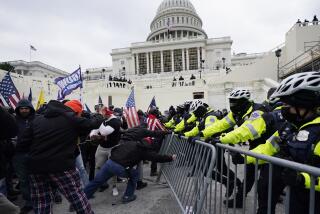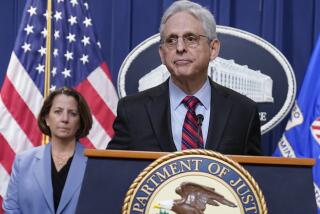FBI Is Improving, Bush Says Ahead of Terrorism Hearings
- Share via
LITTLE ROCK, Ark. — On the eve of congressional hearings into intelligence failures before Sept. 11, President Bush said the FBI and CIA are doing a better job of sharing information but acknowledged that his administration has “got some work to do.”
Bush expressed confidence that the besieged FBI is reshaping its mission to better predict and prevent terrorist attacks. “When you read about the FBI, I want you to know that the FBI is changing its culture,” Bush told a rally of about 2,000 people.
The president’s remarks were among his most extensive on intelligence gathering in connection with the terrorist attacks. Coming just days after the Justice Department announced a major expansion and restructuring of the FBI’s counter-terrorism operation, the comments stressed the progress his administration has made in detecting terrorism--even as it braces for stepped-up criticism from members of Congress.
Bush said that while the FBI previously focused on identifying spies and fighting white-collar crime, “now they’ve got a more important task, and that is to prevent further attack. And ... they’re doing a better job of communicating with the CIA. They’re now sharing intelligence.”
That assertion is likely to spark a skeptical response from some members of Congress, who conduct hearings this week on intelligence failures surrounding Sept. 11. A joint Senate-House panel on intelligence begins meeting today behind closed doors, and the Senate Judiciary Committee will hear public testimony Thursday from FBI Director Robert S. Mueller III and Minneapolis FBI lawyer Coleen Rowley. She wrote a scathing critique last month of the bureau’s handling of the investigation of French-born Zacarias Moussaoui, a flight training student now alleged to have been the “20th hijacker.”
A senior congressional aide who asked not to be identified said that lawmakers have heard claims of better cooperation between the CIA and the FBI many times before.
“It’s the same old story,” the aide said. “After every crisis, we always hear about unprecedented cooperation and new intelligence-sharing. The real question is how effective it’s going to be and whether it’s being used and disseminated.”
Huge Turf Battles
The CIA and the FBI have had notorious turf battles for decades, with each accusing the other of withholding vital information.
The latest flap, surfacing over the weekend, centers on what the CIA knew in early 2001 about the terrorist ties of Khalid Almihdhar and Nawaf Alhazmi--two of the 19 hijackers in the Sept. 11 attacks--and why the agency waited until Aug. 23, 2001, to alert the FBI to be on the lookout for them.
Almihdhar and Alhazmi were living in San Diego at the time, but the FBI was unable to find them in the short time before the attacks.
What this says about relations between the CIA and the FBI will likely draw intense scrutiny during Mueller’s questioning Thursday, according to a Senate Judiciary Committee aide who asked not to be identified.
Committee members also will be keenly interested in hearing from Rowley about the problems she has said contributed to the failure of her FBI supervisors in Washington to aggressively pursue an investigation of Moussaoui, the aide said.
Additionally, the hearings should offer the chance to gauge political support for Mueller. Although he took over as FBI director just eight days before Sept. 11, he has been tarnished by the recent revelations about missed warning signals.
The Wall Street Journal, an influential conservative voice, called last week for Mueller’s resignation.
Mueller Gets Support
But on Monday, the FBI Agents Assn. gave Mueller a vote of confidence. The group, with 10,100 members, said that Mueller “deserves support for these needed reform initiatives” he has proposed, “not calls for his resignation.”
Bush made no mention of Mueller in his speech at the rally for Arkansas Republican politicians, but he made clear that he expects--and believes he is seeing--improvements in collecting intelligence on terrorists.
“In this new war, against this shadowy enemy, it’s very important that we gather as much intelligence as we can,” Bush said. “We need to know what they’re thinking, and what they’re planning on doing, before they do something.”
He also said: “We know we’ve got to do a better job on our borders, understanding who’s coming into the country and who’s leaving and why they’re here, and why they haven’t left.”
Reports of Gaps
As the debate in Washington intensifies about the intelligence community’s performance before Sept. 11, White House officials took pains not to point fingers.
Asked whether Bush had any reaction to the latest reports of gaps in the sharing of information, deputy press secretary Scott McClellan said that Congress, with its oversight responsibility, was the proper body to examine what might have gone wrong.
“Our focus remains on preventing future attacks in America against Americans,” McClellan said.
Bush, in his speech in Little Rock, reiterated his vow that the United States would take “preemptive action” against terrorists--a policy he spelled out in a speech Saturday at the U.S. Military Academy in West Point, N.Y.
“The enemy ... knows that I’m really serious when it comes to routing out harm before it hits America,” he said Monday. “I don’t know whether that’s good or bad they know that, but they’re learning that.”
The president said the best defense for the nation “is to go on the offense.”
During his visit to Arkansas, Bush also sought to pressure the Democratic-controlled Senate to act soon on a measure passed by the House that would renew and toughen the 1996 welfare reform law.
Welfare Bill Considered
The House bill, patterned after administration recommendations, would stiffen work requirements for welfare recipients and provide hundreds of millions of dollars to promote marriage.
Bush’s focus on the issue coincided with the release of the annual government report on welfare statistics.
The report, issued by the Department of Health and Human Services, said that the percentage of the population dependent on welfare had dropped from 5.2% to 3.3% in the three years ending in 1999, the most recent year for which the data are available.
The drop coincided with a surge in economic growth and an overall drop in unemployment during those years.
But Health and Human Services Secretary Tommy G. Thompson told reporters that the rate has continued to drop, falling a full percentage point since then.
Gerstenzang reported from Little Rock, Lichtblau from Washington.
More to Read
Sign up for Essential California
The most important California stories and recommendations in your inbox every morning.
You may occasionally receive promotional content from the Los Angeles Times.










